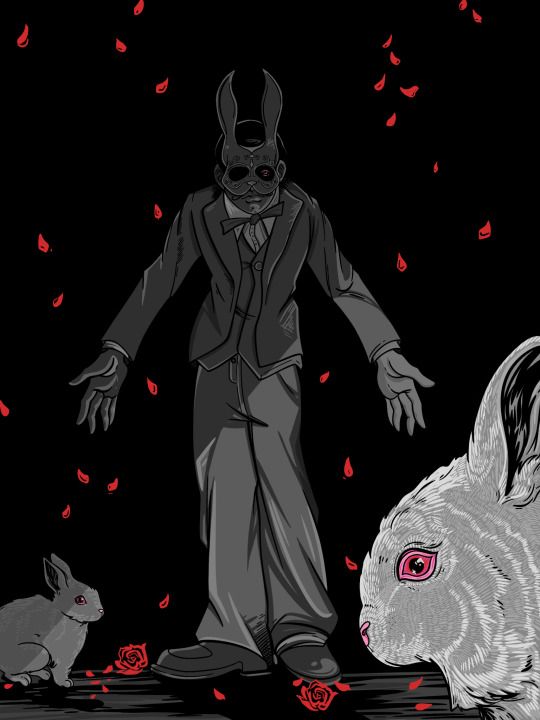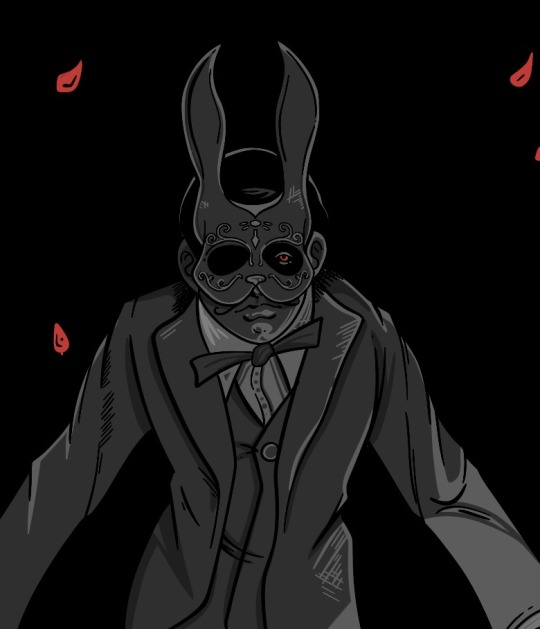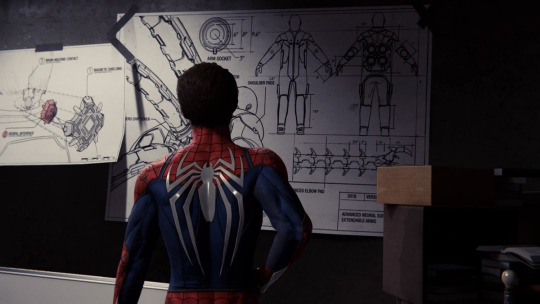#was replaying the first game recently I missed this crazy bastard
Text

I want to take the ears off, but I can't. I hop, and when I hop, I never get off the ground.
details under the cut


#sander cohen#bioshock#bioshock infinite#bioshock 2#burial at sea#was replaying the first game recently I missed this crazy bastard
133 notes
·
View notes
Text
Be Greater

Spider-Man PS4 is a great game. The webswinging and combat were as fluid, frantic and polished as I would expect from the developers of Ratchet and Clank and Sunset Overdrive. I didn’t know what to expect going into the game’s story, though. Since story was never Insomniac Games’s strong suit and the IP they were adapting couldn’t be more..hit or miss in that regard. I came away pleasantly surprised, though.
The story begins with Peter Parker in a different point in his life than most recent Spider-Man media, and it’s a little more interesting for it. Peter is fresh out of college with many of his iconic stories behind him. He’s entering the adult world now and struggling the way through with that typical Parker Luck biting at his heels. This place in the timeline isn't just a novelty and turns out to be key to the story’s. For Peter and his peers the last few training wheels are coming off and with that transition brings ugly truths. Solid ground and stability becomes harder to find and idols are taken off of their pedestals as people with all of their vulnerabilities and vices exposed. Spider-Man has always preached themes of responsibility and this game embodies that better than any book, show, and comic I've seen in a long time. Peter Parker’s personal life is constantly strained by the vigilantism, but he can’t resist the pull of helping others. His ideology of sacrificing himself for others is instilled in him, and it’s this core ideology that defines his entire character. It also undoes him, as the various mentors in his life he thought embodied that reveal their selfish natures.
The first thing I want to give this game credit for is how it handles Peter’s origin. Uncle Ben’s death isn't drawn out and replayed for players because of the reasonable assumption that we’ve all at least seen a Spider-Man movie. His presence, impact, and the hole he leaves in his absence are all tangible and felt throughout the game. From wistful conversations with Aunt May to Peter’s musings when you come across certain collectables that paint a picture of this take on the character’s history, the absence of Uncle Ben’s guidance is felt. Peter is entering a new stage of his life just a bit aimless, and it becomes key in his eagerness to embrace a new mentor figure in the form of Dr Octavius. Their relationship forms the backbone of the game’s story.
Despite the shakey payment, Peter ultimately takes a job with Octavius because he looks up to him. Otto has dedicated himself to fully functional prosthetics for people who've lost their limbs. It's a perfect marriage of Peter’s love of science and devotion to helping others. A dream job. Of course, the job itself turns out to be pretty thankless as Otto struggles to maintain funding for his work and Peter struggles to keep the landlord off his back. The classic relatable struggle to stay afloat that rung more true to me now than ever. Peter continues to reaffirm that it's all worth it, though. The two’s devotion to eachother is rife with tension to anyone who knows these characters though. It was hard to say whether this partnership was just one of many changes made to the universe that would stick or if the game was just waiting to drop the other shoe.
Otto eventually embraces his role in the Spider-Man universe, though. The catalyst wasn’t as simple as “he’s crazy” either. Peter learns partway through that his mentor is affected with a sickness that will destroy his motor functions. His obsession with mechanical limbs has gained a tragic edge: he’s ultimately doing it all to save himself, despite how justified his feelings are. This one little detail makes his spiral just a little more interesting: How long did he know about his disease? How much was his research into his field driven by survivor instinct versus selflessness? Dr. Octavius ends up being one of the most complex characters in the game. He is driven by a mix of a desire to prove his ambitions that have gotten him to nowhere but dead ends are worthwhile before he dies and getting revenge on the man who ruined him: Norman Osborne.
Martin Li has a similar arc. A recent character in comparison to the others in this game, there’s a lot more freedom when there’s less of a legacy to uphold. The team ends up positioning him as another higher authority figure Peter respects with his work running a homeless shelter that Aunt May works for with Peter frequently volunteering. He is essentially a selfless, hardworking man, but he carries a deep darkness inside of him that manifests itself as literal destructive energy that has the power to corrupt others around him. It’s a bit on the nose, but it works as far as the theme of upholding your responsibilities to others. Martin Li genuinely loves the work he does for the city, but the temptation of revenge over tragedy of his parents death consumes him. Martin Li and Otto Octavius are very different characters, but the thing they have in common is that they let the people who look up to them down hard when they give into their hubris and rage.
This is all for revenge against Norman Osborn, and while it may seem like with the trail of blood and rage he’s left in his wake seeking “Devil’s Breath” that he might be a bit of a bastard, one of the game’s most satisfying reveals turns out to paint him in a different light. The “trip” to europe that has kept frequent Spider-Man mainstay Harry Osborn out of the game outside of a series of voice messages seems a bit suspicious from the jump, but most might write it off as a sequel hook and keep playing with it burned far in back of their mind. Harry turns out to be lethally ill, and his “Europe” trip turns out to be a lengthy and so far unsuccessful series of treatments Norman is conducting to save his son’s life. “Devil’s Breath” is so saught after by Norman because it is a failed attempt at a cure he has yet to perfect. For his many, many faults Norman Osborn may ironically be one of the only mentor like figures in this story who is doing his best for his charge. This doesn’t even get into how much of a predominant force Oscorp’s technology is in the city. Ultimate monetary goal or not, Oscorp’s technology redefined several key aspect of New York’s systematic structure in this city. It’s essential, so Norman and Li’s attempts to undercut his influence only really end up harming civilians in the long run. What could be considered Spider-Man’s greatest nemesis comes out of this game pretty clean.
Some of this game’s emotional highs come from the heartbreak Peter experiences when he finds out Osborn and Li’s true natures. One of the hardest hitting moments in the game comes from the rage Peter feels when Octavius knew he was Spider-Man all along. The lethal battles that defined the entire game’s second half all get recontextualized as Peter realizes that even he was disposable if it meant Octavius could achieve his goals. Octavius’s mind is supposedly being manipulated by the tentacles at this point but his plan has been so far reaching and so well thought out that it’d had to have been at least formulating before that point. To put it simply: Otto was always a bit of a bastard. The arms just exaggerated what was ultimately already there.
This is why Aunt May’s place in the game is so important, and her death even more significant to the game’s themes. She remains Peter’s rock: a remarkable, near flawless influence of a good, hardworking person who helps others no matter the cost. When Peter loses his apartment, Aunt May immediately gives him space in her office, and her generosity doesn’t just end at family. She takes full control of the homeless shelter and continues to help others even as things become grim in New York. FEAST becomes a safe haven for not just Peter, but many of the lost and injured in the wake of the destructive egoes of the game’s antagonists. That’s why it’s all the more impactful and important that she ultimately dies as a result of her actions. She gets infected with Devil’s Breath while helping to treat those inflicted. In the most painful moments of the game’s surprisingly dark story, Peter must choose the rest of New York over her. It’s what Aunt May would want, and what she was doing all along, but Peter having to make that sacrifice in such a brutal way outlines one of the classic Spider-Man morals perfectly. To take some choice words from Peter himself here: “Doing the right thing, even when it hurts like hell.”
With Aunt May gone and his other mentors fallen Peter has completed his transition to adulthood. There’s simply no one left for him to look up to for guidance. He can only move forward with what they’ve given him and try to be the best person he can be. The whole point of the subplot with Miles is to set up Peter with his own charge: someone lost that looks up to him for guidance. Even Peter notices how similar their situations are and offers to take him under his wing himself. The credits sequence where the two find kindred spirits in eachother over their Spider-Powers is heartwarming, and I’m guessing the sequel will explore this game’s themes further through this dynamics. Peter Parker isn’t above falling short or making the wrong choices, so it’ll be interesting to see how those decisions influence Miles in later parts of the story. Time will tell if Peter can help Miles turn his pain into empathy. The future looks bright for now, but things never go quite so smoothly in the world of the wall-crawler
It goes without saying at this point, but Spider-Man PS4’s story is about being good not just for it’s own sake, but for the sake of others that need that guidance or even just a shoulder to lean on. It’s about sharing your strengths with others. It’s about resisting the temptation to lash your pain out on the world. It’s the time old “With great power, comes great responsibility” personified. Most importantly though, it’s about how instilling this lesson into the next generation is important. Superheroes, at their core, were about entertaining young, impressionable audiences. It also doesn’t hurt to have some words of wisdom for them. Be greater.
36 notes
·
View notes